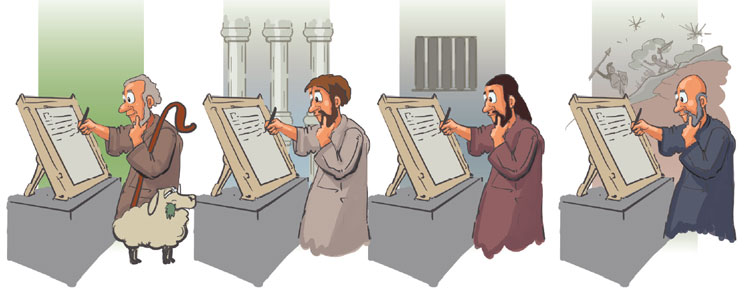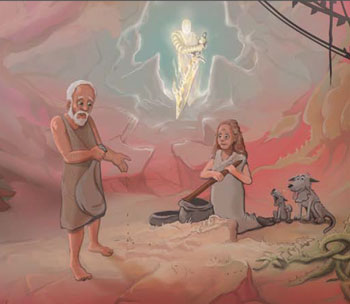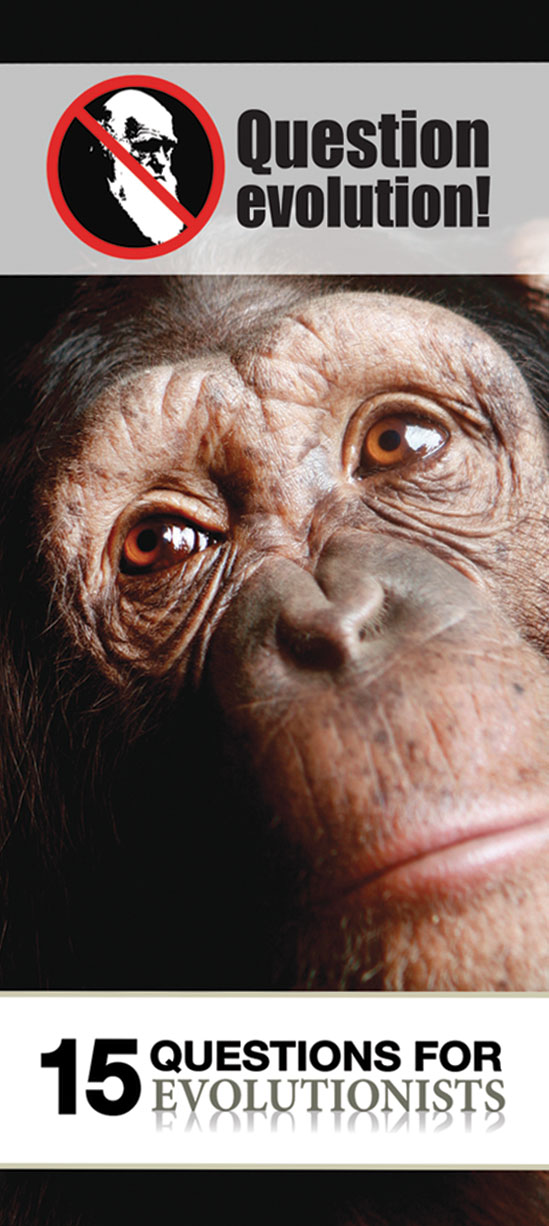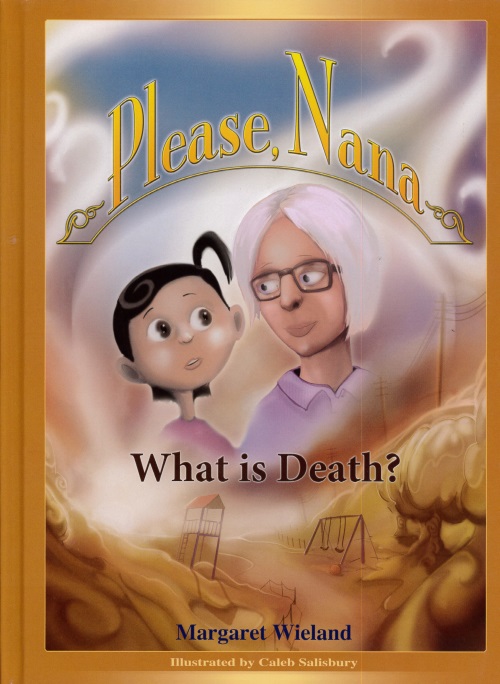The time that people forgot

Hanging1 in space, is a very beautiful planet. It is called Earth.
Earth is unlike anywhere else in the universe. It has lots of green plants. It has creatures that walk on the land, swim in the sea and fly in the sky. And it has people.
At first, there were not many people. But as time passed, there came a time when there were so many people on Earth, that they were counted in the billions.
The people were very smart. Someone invented a story. It was a very clever story which many people liked. It became so popular that it was told and re-told everywhere.
It was taught in schools, colleges and universities. It was on TV. In newspapers. In films.
Even though it was only a story, many people thought it was true. Even presidents, prime ministers and other leaders believed it. Could you blame them? The story was everywhere.
It was in thousands and thousands of magazines and books. It was mentioned on information signs at zoos, botanic gardens, museums, national parks and scenic lookouts. It was such a powerful story that it changed the way people looked at the world.
It even affected their behaviour—the way they treated one another.

How could a story have such impact? Simple. The story was about where we came from.
The story said that billions of years ago there was a ‘big bang’, and our universe was born.
Then, billions of years later our Earth and moon formed from hot rocks swirling in space. Then after another billion years or so, as Earth cooled and water began to pool on the surface, the first life appeared in that water. The first living thing was a tiny cell, something like bacteria, and it could make copies of itself. So as time passed, there were soon many microbes.
Billions more years passed, the story said, and some microbes had slowly changed into forms of life like seaworms, jellyfish, then sharks and later still, fish. And some of those sea creatures became forms that could also live on land, something like frogs and salamanders can do. And from them came all the land creatures and birds we see today.
Along the way, according to the story, there was a time that dinosaurs ruled the earth, but they became extinct before man appeared. Man didn’t walk on earth until millions of years later. After man had evolved from some ape-like creature, he was a Stone Age hunter-gatherer for at least a hundred thousand years, before finally learning to grow crops and keep livestock.

But all of this was just a story. The real history of the world was nothing like that. The people had forgotten what really happened.
The earth was much, much younger than the story said. The earth and the whole universe had been created only around 6,000 years earlier, in just six days. But the people had forgotten about that time. They’d forgotten about big events that happened during that time. And they’d forgotten about their Creator. They’d forgotten that their Creator created all things, including time itself.
They’d forgotten that their Creator—God—had spoken directly to certain people about the six days of creation and key events that happened afterwards, and that this had then been written down.2 Written down so that all people could know what God had said.

These writings, called “The Scriptures”, can be read today in a book called The Bible.
And from God’s Word in the Bible we see that God knew there would come a time when people forgot about the time He created the earth.3 (As well as what really happened after that.) These words in the Bible were written nearly two thousand years ago:

In the last days scoffers will come, scoffing and following their own evil desires. … But they deliberately forget that long ago by God’s word the heavens existed and the earth was formed out of water and by water.4
So we can see that two thousand years ago God knew that there would come a time when people would forget. That time is now. People have forgotten that the earth was at first covered with water, and that it had been formed by God speaking. Instead, today, people are taught an evolution story that says the early earth was a hot molten ball with no liquid water anywhere. And that it formed by itself—“no creator was needed”.
What else have people forgotten? They’ve forgotten the order in which God created things. First the earth on Day 1 covered with water, then the sky on Day 2. Dry land appeared on Day 3, which is when God made the plants.
But God hadn’t made the sun yet. But He had made light (which plants need) on the first day. As the newly created earth slowly turned once, twice, three times, there was night-time and daytime, night-time and daytime, night-time and daytime. All was now ready for the fourth day.

It was on Day 4 that God made the sun, the moon, and all the other ‘lights in the sky’. Although the stars are very far away, they are so bright that we can see many of them with just our own eyes.
And with telescopes we can see there are pretty features such as ‘rings’ around planets and staggeringly huge nebulae, beautifully arranged. Truly, as the Scripture says, “The heavens declare the glory of God; the skies proclaim the work of his hands.”5
But many people today have forgotten this. And they’ve forgotten that the earth came first, before any of these heavenly bodies. And deceived by the story that life evolved, and therefore could have evolved on other planets, they’ve forgotten that the Scripture says it was the earth God made to host life:
he who created the heavens,
he is God;
he who fashioned and made the earth,
he founded it;
he did not create it to be empty,
but formed it to be inhabited6
With the sun now in place to shine on the plants and to indicate days and seasons and years, the earth was now ready for living creatures.

It was on Day 5 that God created creatures to live in water, and creatures to “fly above the earth across the expanse of the sky”. Note that there were no dinosaurs yet—the exact opposite of the evolution story which says dinos came before birds. No, dinosaurs were not made until the following day, Day 6, along with all the other land animals—and man.
But today many people have forgotten this. They think that man is ‘just another animal’—as if philosophers are descended from fish, and are therefore no more important than that. But in reality man was created special, to “rule over” the fish and all the other creatures. Because, unlike the animals:
God created man in his own image,
in the image of God he created him;
male and female he created them.7
And so God made Adam and Eve, placing them in the Garden of Eden. Adam’s job was “to work it and take care of it”.8

But little did Adam know that his own action in this idyllic setting would bring about the greatest catastrophe the universe has ever seen.
It wasn’t as if Adam hadn’t been warned. God had told Adam that he was allowed to eat from any tree in the garden except one. “You must not eat from the tree of the knowledge of good and evil,” God said, “for when you eat of it you will surely die.”
For at least the rest of that day, Adam obeyed. He did not eat the fruit from that tree. At the end of that sixth day of Creation Week, God looked at everything He had made and saw it was “very good”.9 There was no death or sickness anywhere. All the animals ate plants. Adam and Eve were allowed to eat fruit from the other trees in the Garden—including the Tree of Life, in the middle of the Garden of Eden. There were no thorns on any of the plants, anywhere. Everything on Earth was very good. All the angels were very good. They all obeyed God.
Thus God finished making the heavens and the earth, and rested on the seventh day, declaring it holy.

However, it seems it wasn’t long before one of the leading angels stopped being “very good”. Today we refer to him as ‘Satan’. He appeared to Eve as a crafty serpent in the Garden of Eden, persuading her to take some fruit from the tree of the knowledge of good and evil and eat it. She also gave some to Adam, who was with her, and he ate it.
“You will not surely die,” the serpent had said.10
But he had lied. The one that Jesus later referred to as “the father of lies” had just told a colossal lie. Adam and Eve had fallen for it, and disobeyed God. The moment they ate that fruit, they suddenly knew that things were no longer so rosy.
The first thing they did was to sew fig leaves together to make coverings for themselves—for they realised they were naked. The second thing they did was to try to hide from God—which of course no-one can do because God sees everything. When God challenged Adam about his disobedience, Adam blamed God and Eve: “The woman you put here with me—she gave me some fruit from the tree and I ate it.”11
Eve blamed the serpent: “The serpent deceived me, and I ate.”12
But there was no escaping from the fact that Adam had disobeyed God (an event we today call ‘The Fall’), and the creation would never be the same again.

Because of Adam’s sin, the things that Adam had been put in charge of by God, to “rule over”, would now be subject to the ‘Curse’. Death would come to every animal and bird—some would now even be eaten by others. Cursed above all of these was the serpent, condemned now to crawl on its belly.13 Eve and all her female descendants would have pain in childbearing—yet they would still want to marry and have children.14
And to Adam, God said that the very ground was cursed because of him. Adam would now have to painfully toil and till the soil, by the sweat of his brow, to grow food.15 He would now have to contend with “thorns and thistles”, for the plant world had been cursed, too.16 Just as Adam had been taken from the ground, he would now return to it, “for dust you are and to dust you will return”, God told him.17
Adam would now surely die. Although he survived much longer than people do today (Adam lived to 930 years of age), he surely died,18 just as God had warned.19
And so death comes to us all. But today many people have forgotten that there was once a time with no pain or death (a “very good” world which Adam and Eve were the only humans ever to have experienced). Instead, they believe the evolution story idea that death is ‘normal’—‘a natural part of life’—and that mutations (copying mistakes in our genes) are ‘normal’.

From our online article The 3 Rs of evolution: Rearrange, Remove, Ruin—in other words, no evolution!
But when someone we love dies, we know in our heart that something is not right.20 And similarly, when we look at mutations such as the ‘floppy-eared syndrome’ in dogs, we should realize as we see the poor dog’s ears covered in food scraps from its dinner dish, that something is not right. We might have become so used to seeing these things that we think they’re ‘normal’ and even ‘cute’. But if Adam were around to see such dogs today, he would no doubt be shocked. The original “very good” dogs had ears that stood erect—all the better for hearing things well!
Today, there are more and more genetic deformities than ever before. Looking at that, scientists who believe the evolution story are puzzled as to why humans haven’t already become extinct long ago. But that’s because they believe in millions of years—the millions and billions of years that evolutionary scientists assign to the fossil ‘record’. From the Bible we know instead that the whole creation is only about 6,000 years old, so it makes sense that, even though we’re in terrible genetic decline, we’re still here.21
And the Bible also tells of a huge and catastrophic event22 that happened after Adam sinned, about 1,656 years after Creation Week, which beautifully explains the fossils. It’s an event which completely re-landscaped the world of that time, about 4,500 years ago. An event that the Bible says that people would later “deliberately forget”—a global Flood:
“But they deliberately forget … by water also the world of that time was deluged and destroyed.”23

The world had become “corrupt in God’s sight and filled with violence”,24 so God destroyed the earth in a terrible, global Flood. But first He told Noah to build an Ark, so that Noah and his family, and pairs of all kinds of land animals and flying creatures would be spared to repopulate the earth afterwards.
And so it happened, which means that all people today are descended from Noah. When you consider this timeline of a new start to humanity 4,500 years ago, along with normal population growth rates, it fits nicely with the number of people on Earth today. And the Bible explains the origins of languages, too25—in stark contrast to the evolution story, which doesn’t.
Sadly, however, many people today can’t see this. They can’t see that the evidence around them fits the Bible’s account of the Flood. They can’t see that the layers-upon-layers of sediment in the rocks all around the world show all the signs of having been laid down quickly, in the global Flood. Signs such as the billions of plant and animal fossils, preserved in the rocks. They can’t see that steep-sided canyons and vast, flat plains are a legacy of the almost unimaginably huge volumes of water pouring off the continents at the end of Noah’s Flood.

They can’t see this, because they’ve forgotten … about Creation, and the Flood, just as the Bible said they would.

And they’ve forgotten about Jesus. Jesus Christ, the only begotten Son of God, sent by God, as the Bible says, so that “whoever believes in Him should not perish, but have everlasting life”.26
Thankfully, not everyone has forgotten. There are still people today who believe what God has said—what is written in the Bible. They are known as Christians, and many of them speak out boldly about the Good News of our Lord and Saviour, Jesus Christ, to a world that’s forgotten about Him. They call people to turn away from sin, and pursue God’s righteousness instead. They say we should turn away from evolutionary ideas that might justify hard-heartedness, and that we should instead ‘love our neighbour’, yes, even our enemy, as we would want them to love us. The Bible says that people who lead many others to righteousness will shine like the bright stars, forever and ever.27
Read the Bible to know more about all this, and to be able to tell others about Jesus, lest they ‘forget’. Then you, too, can ‘shine’ for Him!

A public reading
A video film clip of the author, David Catchpoole, reading this story aloud to staff and visitors at the CMI-Australia office in Brisbane in September 2014 on the occasion of his retirement, can be viewed here:
References and notes
- Job 26:7. Return to text.
- Hebrews 1:1. Return to text.
- Jude 1:17-18. Return to text.
- 2 Peter 3:3–5. Return to text.
- Psalm 19:1. Return to text.
- Isaiah 45:18. Return to text.
- Genesis 1:26. Return to text.
- Genesis 2:15. Return to text.
- Genesis 1:31. Return to text.
- Genesis 3:4. Return to text.
- Genesis 3:12. Return to text.
- Genesis 3:13. Return to text.
- Genesis 3:14. Return to text.
- Genesis 3:16. Return to text.
- Genesis 3:17. Return to text.
- Genesis 3:18. Return to text.
- Genesis 3:19. Return to text.
- Genesis 5:5. Return to text.
- Genesis 2:17. Return to text.
- 1 Corinthians 15:26. Return to text.
- Romans 8:19–22. Return to text.
- Genesis 6–9. Return to text.
- 2 Peter 3:5–6. Return to text.
- Genesis 6:11. Return to text.
- Genesis 10–11. Return to text.
- Genesis 3:16; also see 1 Corinthians 15:21–22. Return to text.
- Daniel 12:3. Return to text.




















Readers’ comments
Comments are automatically closed 14 days after publication.